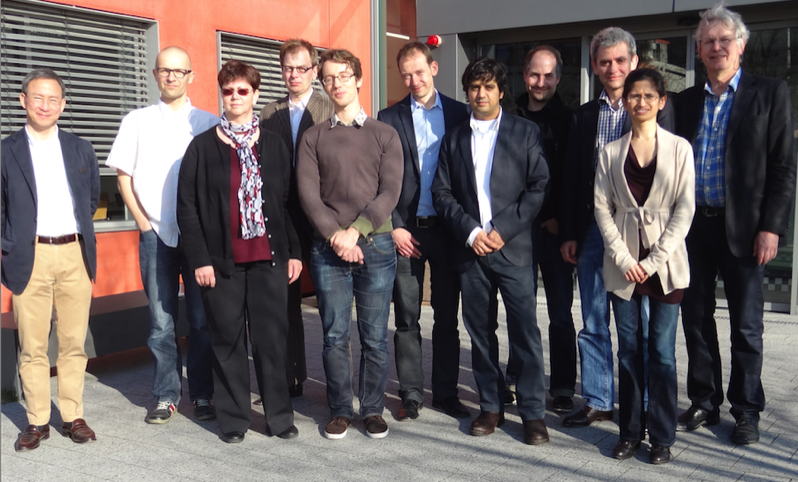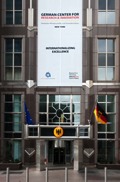
Design Meeting 2014:
Spatial Design, Cognition, and Technology
The upcoming DesignMeeting 2014 is organised as a two day workshop (Mar 10-11 2014) to particularly focus on investigating the potential for multi-disciplinary research on "Spatial Design, Cognition, and Technology" internationally, and in particular in the European context.
Participation in the DesignMeeting 2014 is by invitation only; a relatively small group of researchers has been invited based on participation in past events and collaborations related to the topic. However, we do expect this meeting to set the stage for a larger gathering in the near future, thereupon also soliciting interest with an open call for participation and contributions. Please do email us if you would like us to keep you informed on further developments in the meantime.
Workshop Organizers
Mehul Bhatt (University of Bremen, Germany)
Christoph Hölscher (ETH Zurich, Switzerland)
Christian Freksa (University of Bremen, Germany)
Christoph Schlieder (University of Bamberg, Germany)
Inquiries: bhatt@informatik.uni-bremen.de
Christoph Hölscher (ETH Zurich, Switzerland)
Christian Freksa (University of Bremen, Germany)
Christoph Schlieder (University of Bamberg, Germany)
Inquiries: bhatt@informatik.uni-bremen.de
About the Meeting
This workshop brings together researchers and practitioners with an interest in designing spatial environments, and with investigating the cognition of the designed environments as well as the cognition of the design process itself. The workshop approaches the design process, and the use of designed structures (e.g., built-up environments) from a cognitive and computational perspective emphasizing the importance of the visuo-spatial thinking involved in problem-solving for spatial design. Particular topics being emphasised are:
The workshop provides a platform to discuss the cognitive and computational foundations that would underlie the development of next-generation spatial design systems, design practices, and people-centered assistive frameworks & technologies encompassing the multi-faceted nature of professional design conception and implementation.
Scientific Context
Understanding and supporting design from a cognitive perspective has been established as a highly successful research paradigm in the international communities of cognition, computing, and engineering during the past decade. Research results and applications from a broad range of design tasks are found, for instance, in the Design Computing and Cognition Conference series.
Most recently, a research community has formed around the specific topic of design tasks related to spatial environments, especially -but not exclusively- in architecture design. The Spatial Cognition Research Center (SFB/TR 8) has taken an active part in this development, initiating and hosting a series of international workshops in collaboration with international partners to bring together researchers across disciplines interested in spatial design. Several recent initiatives have been undertaken in the recent past in this direction; the DFG-NSF supported Spatial Cognition for Architecture Design (SCAD) 2011 symposium (New York, USA) is one instance of this.
Most recently, a research community has formed around the specific topic of design tasks related to spatial environments, especially -but not exclusively- in architecture design. The Spatial Cognition Research Center (SFB/TR 8) has taken an active part in this development, initiating and hosting a series of international workshops in collaboration with international partners to bring together researchers across disciplines interested in spatial design. Several recent initiatives have been undertaken in the recent past in this direction; the DFG-NSF supported Spatial Cognition for Architecture Design (SCAD) 2011 symposium (New York, USA) is one instance of this.
Core Agenda
In the discussions at the past events connected with this workshop, a number of conclusions emerged that merit further discussions at the present workshop. Furthermore, expertise from outside the research community of spatial cognition for design is also needed to address related issues. The core agenda for the workshop includes the following:
Participation
Participants are requested to submit a Position statement by: Feb 24 2014. Please use the online Easychair submission system to upload your position statement in PDF format. [Online submission system].
The position statement should consist of:
The position statement should consist of:
- - your core research community by way of a brief state of the art
- - your own research (e.g., citing key publications in the last 5 years, projects etc)
- - a brief statement on the relationship of your research topics to the theme of the workshop
- - three research questions that are considered to be ``big'' challenges in your area of work
All position statements and participant profiles will be disseminated both before (closed group) and after (publicly) the event. Public dissemination will be done via the Online SFB/TR 8 Spatial Cognition Technical Report Series.
Meeting Venue
The meeting is hosted on campus at the University of Bremen, and the hotel is conveniently located within walking distance from the venue: Directions to the Meeting Venue and Hotel (PDF)
University of Bremen
Cognitive Systems (AG Freksa)
Enrique-Schmidt-Str. 5
Building: CARTESIUM, Level 3
Bremen 28359, Germany
Sekretariat:
Ms. Gracia Kranz, or
Ms. Evgenia Sazokina
Tel: +49(0)42121864231
Email: cosy@informatik.uni-bremen.de
www: http://cosy.informatik.uni-bremen.de
CoSy@Google Maps
University of Bremen
Cognitive Systems (AG Freksa)
Enrique-Schmidt-Str. 5
Building: CARTESIUM, Level 3
Bremen 28359, Germany
Sekretariat:
Ms. Gracia Kranz, or
Ms. Evgenia Sazokina
Tel: +49(0)42121864231
Email: cosy@informatik.uni-bremen.de
www: http://cosy.informatik.uni-bremen.de
CoSy@Google Maps



